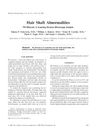Studies on the Proteome of Human Hair: Identification of Histones and Deamidated Keratins
January 2018
in “
Scientific reports
”

TLDR Human hair contains diverse proteins, including keratins and histones, which could help assess hair health and aging.
The study on the human hair proteome revealed a diverse array of proteins, including keratins, keratin-associated proteins (KAPs), and intermediate filament proteins, which are involved in stress response, immunity, epidermis development, and the hair cycle. Significant deamidation of keratin types I and II and KAPs was observed. Additionally, hair shafts contained histones known for their antimicrobial properties. This proteomic analysis suggested that understanding the composition and modifications of hair proteins could lead to new biomarkers for assessing hair health, diseases, and aging.






